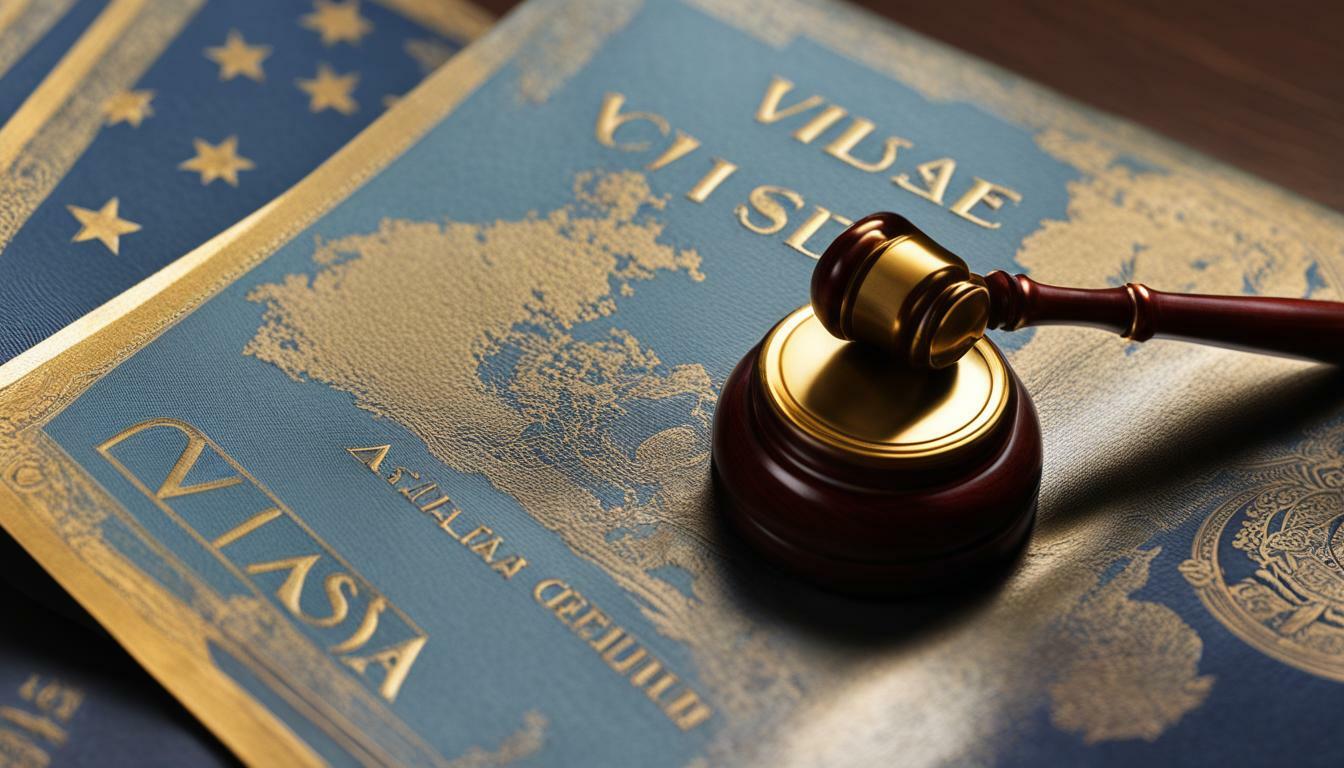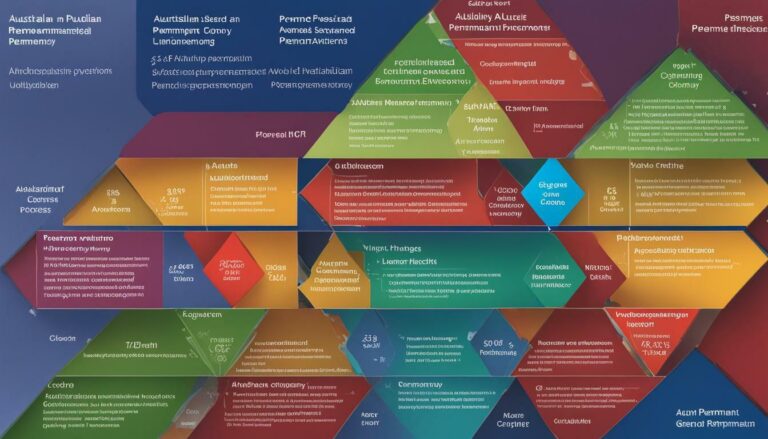What are Grounds for Cancelling an Australian Permanent Visa?
Canceling an Australian permanent visa can have serious implications, and it is essential to be aware of the grounds that can lead to visa cancellation. In Australia, the grounds for canceling a permanent visa are outlined under section 501 of the Migration Act. The decision-making process involves a two-stage assessment, beginning with the character test. If an individual fails to satisfy the Minister that they pass the character test, their visa can be refused or canceled.
Key Takeaways:
- The character test is a crucial factor in determining visa cancellations in Australia.
- Grounds for visa cancellation include a substantial criminal record, conviction for immigration detention offenses, association with persons suspected of engaging in criminal conduct, past and present criminal or general conduct, and a significant risk of particular types of future conduct.
- The Minister has discretionary powers to refuse or cancel a visa based on national interest.
- Visa cancellations can be appealed to the Administrative Appeals Tribunal (AAT) and, if necessary, to the Federal Circuit and Family Court of Australia (FCFCA).
- Responding to a Notice of Intention to Consider Cancellation (NOICC) and seeking legal advice is crucial in visa cancellation situations.
Understanding Section 501 of the Migration Act
Section 501 of the Migration Act provides the basis for canceling an Australian permanent visa and sets out the criteria that must be considered. The decision-making process involves a two-stage process, where the Minister or delegate assesses whether the person passes the character test. Failure to satisfy the character test can lead to visa refusal or cancellation.
The character test encompasses several grounds that are considered when determining whether an individual’s visa should be canceled. These include having a substantial criminal record, conviction for immigration detention offenses, association with persons suspected of engaging in criminal conduct, and past and present criminal or general conduct.
When assessing a person’s character, the Minister also takes into account the risk of future conduct. If there is a significant risk that the individual may engage in certain types of conduct in the future, their visa may be canceled. Additionally, the Minister holds discretionary powers to refuse or cancel a visa based on national interest.
Appeals and Legal Recourse
In the event of visa cancellation, individuals have the right to appeal the decision through the Administrative Appeals Tribunal (AAT). The AAT is an independent body that reviews visa cancellation decisions and can overturn them if there are grounds for doing so. If the AAT appeal is unsuccessful, there may be an opportunity to further appeal to the Federal Circuit and Family Court of Australia (FCFCA).
It is essential for individuals facing visa cancellation to respond to a Notice of Intention to Consider Cancellation (NOICC) within the prescribed time frame. Seeking legal advice in these situations is crucial, as experienced immigration lawyers can provide guidance and support throughout the process.
Visa cancellation can have severe consequences, including being deemed unlawful and subject to detention and deportation from Australia. Therefore, it is important for individuals to understand the grounds for visa cancellation and their rights to appeal and seek legal recourse.
| Grounds for Visa Cancellation | Criteria Considered |
|---|---|
| Substantial criminal record | Previous convictions and their severity |
| Conviction for immigration detention offenses | Offenses related to the detention of individuals in immigration facilities |
| Association with persons suspected of engaging in criminal conduct | Connections to individuals involved in criminal activities |
| Past and present criminal or general conduct | History of criminal behavior or misconduct |
| Significant risk of particular types of future conduct | Likelihood of engaging in specific types of conduct in the future |
| Ministerial discretion based on national interest | Considerations of Australia’s national interest |
“Visa cancellation decisions are based on a thorough assessment of an individual’s character and conduct. It is crucial for visa holders to comply with Australian laws and regulations to maintain their visa status and avoid potential cancellation.” – Immigration lawyer
The Character Test and Visa Cancellation
The character test plays a crucial role in determining whether an individual passes the requirements to retain their Australian permanent visa. Under section 501 of the Migration Act, the character test assesses various aspects of an individual’s conduct and associations to determine their suitability to hold a visa. It is important for visa holders to understand the grounds for visa cancellation and take necessary precautions to maintain their visa status.
Grounds for Visa Cancellation
The character test considers several factors that can lead to visa cancellation. These include a substantial criminal record, conviction for immigration detention offenses, association with persons suspected of engaging in criminal conduct, and past and present criminal or general conduct. Additionally, if an individual poses a significant risk of future conduct that would be prejudicial to the community, their visa may also be cancelled.
It is important to note that the Minister has discretionary powers based on national interest to refuse or cancel a visa, even if an individual does not meet the specific grounds for cancellation. The Minister takes into account various factors such as community safety, protection of vulnerable individuals, and the public interest when making such decisions.
Appeals and Legal Recourse
If a visa cancellation decision is made, individuals have the right to appeal. The first step is to lodge an appeal with the Administrative Appeals Tribunal (AAT). The AAT is an independent body that reviews decisions made by the Department of Home Affairs. If the AAT appeal is unsuccessful, there may be an opportunity to further appeal to the Federal Circuit and Family Court of Australia (FCFCA).
It is crucial for individuals who receive a Notice of Intention to Consider Cancellation (NOICC) to respond within the prescribed time frame and seek legal advice. Legal professionals specializing in immigration law can provide guidance on the best course of action and help individuals navigate the complex appeals process.
| Grounds for Visa Cancellation | Appeals Process |
|---|---|
|
|
Visa cancellations can have severe consequences, including being deemed unlawful and subject to detention and deportation from Australia. It is essential for individuals to be aware of the character test requirements and adhere to the conditions of their visa to avoid any potential cancellations. Seeking legal advice and promptly responding to any NOICC can greatly assist in protecting visa status and ensuring a smooth immigration journey in Australia.
Substantial Criminal Record and Visa Cancellation
A substantial criminal record is a significant factor that can result in the cancellation of an Australian permanent visa. Under section 501 of the Migration Act, individuals with a history of serious criminal offenses may fail the character test, leading to visa refusal or cancellation. The character test aims to ensure that visa holders adhere to the highest standards of conduct and do not pose a risk to the Australian community.
According to the Australian Department of Home Affairs, a substantial criminal record is generally defined as a person’s conviction for one or more offenses that resulted in imprisonment for at least 12 months. However, it’s essential to note that even a prison sentence shorter than 12 months may still be considered substantial if the offenses involved are particularly serious or indicative of a pattern of criminal behavior.
To determine whether a person’s criminal record is substantial, the Department considers the nature and seriousness of the offenses, the person’s age at the time of conviction, the length of the sentence, the time that has passed since the offense, and any other relevant factors.
| Factors Considered for Substantial Criminal Record | Potential Impact on Visa Status |
|---|---|
| Nature and seriousness of offenses | Can lead to visa cancellation |
| Length of imprisonment | Imprisonment for at least 12 months is generally considered substantial |
| Time passed since the offense | A longer period since conviction may be favorable |
| Other relevant factors | Individual circumstances and potential for rehabilitation are considered |
It is crucial to understand that having a substantial criminal record does not automatically lead to visa cancellation. The Department assesses each case individually and takes into account factors such as rehabilitation, family ties, and the best interests of any children involved. Seeking legal advice in situations where visa cancellation may be a risk is highly recommended to navigate the complex immigration laws and processes effectively.
Conviction for Immigration Detention Offenses
Convictions for immigration detention offenses can have severe consequences, including the cancellation of an Australian permanent visa. When individuals commit offenses related to immigration detention, such as assisting in the escape of detainees or engaging in illegal activities within detention facilities, their visa status may be at risk.
Under section 501 of the Migration Act, the character test takes into account any criminal records and associations with individuals involved in criminal conduct. This includes offenses related to immigration detention. If a person is found guilty of such offenses, their visa can be canceled, rendering them unlawful and subject to detention and potential deportation from Australia.
The importance of understanding and adhering to the rules and regulations regarding immigration detention cannot be overstated. Committing offenses within these facilities not only jeopardizes an individual’s visa status but also undermines the integrity of the immigration system.
| Offense | Consequences |
|---|---|
| Assisting in the escape of detainees | Visa cancellation, detention, and potential deportation |
| Engaging in illegal activities within detention facilities | Visa cancellation, detention, and potential deportation |
It is crucial for individuals to be aware of the implications of their actions and to seek legal advice if they find themselves facing charges related to immigration detention offenses. Responding promptly to a Notice of Intention to Consider Cancellation (NOICC) within the prescribed time frame is essential in such situations.
If a visa cancellation is issued, individuals may have the right to appeal the decision to the Administrative Appeals Tribunal (AAT). If the AAT appeal is unsuccessful, there may be a further opportunity to appeal to the Federal Circuit and Family Court of Australia (FCFCA). Seeking professional legal representation during the appeals process is highly recommended to navigate the complexities of immigration law and increase the chances of a successful outcome.
Overall, it is essential to understand the severe consequences associated with immigration detention offenses and to prioritize compliance with the laws and regulations governing immigration in Australia. By doing so, individuals can safeguard their visa status and ensure their lawful presence in the country.
Association with Persons Suspected of Engaging in Criminal Conduct
Association with persons suspected of engaging in criminal conduct can be a basis for the cancellation of an Australian permanent visa. Under section 501 of the Migration Act, the Australian government has the authority to refuse or cancel a visa if an individual fails to meet the character test. This test takes into consideration various factors, including associations with individuals involved in criminal activities.
If you are found to have significant ties to persons suspected of engaging in criminal conduct, it can raise concerns about your character and your suitability to hold a permanent visa. The Australian authorities take these associations seriously and view them as a potential risk to the community.
It’s important to note that mere associations alone may not automatically result in visa cancellation. The Australian government considers the nature and extent of the association, as well as any evidence of participation, involvement, or support in criminal activities. Each case is assessed on an individual basis, taking into account all relevant factors.
| Grounds for Visa Cancellation: | Associated Consequences: |
|---|---|
| Association with persons involved in criminal conduct | Potential visa cancellation |
| Strong evidence of active participation or support in criminal activities | Increased likelihood of visa cancellation |
| Minimal or superficial association with persons involved in criminal conduct | Less likely to result in visa cancellation |
If you have received a Notice of Intention to Consider Cancellation (NOICC) based on your association with persons suspected of engaging in criminal conduct, it is crucial to respond within the given timeframe and seek legal advice immediately. An experienced immigration lawyer can guide you through the process and help present your case to the authorities.
Remember, while association with persons suspected of engaging in criminal conduct can be grounds for visa cancellation, it is essential to provide evidence and supporting information that demonstrates your own good character and lack of involvement in any illicit activities. By understanding the visa rules and seeking professional assistance, you can navigate through this challenging situation and protect your visa status in Australia.
Past and Present Criminal or General Conduct: Grounds for Australian Visa Cancellation
Past and present criminal or general conduct can jeopardize the status of an Australian permanent visa and lead to its cancellation. Under section 501 of the Migration Act, the character test plays a crucial role in determining whether a person meets the requirements for a visa. This character test includes various grounds that may result in visa cancellation, such as a substantial criminal record or associations with individuals suspected of engaging in criminal conduct.
Having a substantial criminal record is one of the grounds for visa cancellation in Australia. A substantial criminal record refers to convictions that result in a prison sentence of 12 months or more. Such convictions can significantly impact the character assessment of an individual and may lead to the cancellation of their permanent visa.
Additionally, any past or present criminal or general conduct may also be considered grounds for visa cancellation. This assessment takes into account an individual’s behavior and conduct, both inside and outside of Australia. Factors such as involvement in illegal activities, fraudulent behavior, or engaging in activities that pose a risk to the Australian community can result in visa cancellation.
It is important to note that the Minister has discretionary powers to refuse or cancel a visa based on national interest. This means that even if an individual does not meet the specific grounds for visa cancellation, the Minister can still make a decision based on the overall circumstances and potential risks to the country.
| Grounds for visa cancellation | Description |
|---|---|
| Substantial criminal record | Convictions resulting in a prison sentence of 12 months or more |
| Association with persons suspected of engaging in criminal conduct | Connections with individuals involved in illegal activities |
| Past and present criminal or general conduct | Engagement in illegal activities or behavior that poses a risk to the community |
If a Notice of Intention to Consider Cancellation (NOICC) is received, it is crucial to respond within the provided time frame and seek legal advice. Visa cancellations can have severe consequences, including being deemed unlawful and facing detention and deportation from Australia. Understanding the grounds for visa cancellation and taking necessary steps to address any potential issues is essential for maintaining the status of an Australian permanent visa.
Significant Risk of Future Conduct
Demonstrating a significant risk of engaging in certain types of conduct in the future can be a basis for canceling an Australian permanent visa. Under section 501 of the Migration Act, the character test is used to assess the potential for future misconduct and its impact on the Australian community. This involves evaluating factors such as criminal history, associations with individuals involved in criminal conduct, and past and present general conduct.
The character test aims to ensure that visa holders uphold the values and standards of the Australian society. It takes into consideration the potential risks posed by individuals who may engage in conduct that is detrimental to the community or poses a threat to national security. This includes acts such as serious crimes, violent behavior, or involvement in activities that may harm vulnerable individuals or groups.
To assess the significant risk of future conduct, the relevant authorities consider various factors, such as the seriousness and nature of past behavior, the likelihood of reoffending, and the potential harm that may result from such conduct. The decision-making process involves a careful evaluation of all available evidence, including criminal records, character references, and any other relevant information about the individual’s behavior and associations.
| Factors Considered for Significant Risk of Future Conduct | Implications for Visa Status |
|---|---|
| Criminal records | Can lead to visa cancellation if the offenses are serious or indicate a pattern of criminal behavior. |
| Associations with individuals involved in criminal conduct | May raise concerns about an individual’s loyalty, character, or potential involvement in illegal activities. |
| Pattern of past and present general conduct | If the behavior is indicative of a significant risk to the community, the visa may be canceled. |
It is important to note that the decision to cancel a visa based on the significant risk of future conduct lies with the Minister or delegate. This discretionary power allows the authorities to consider the best interests of the Australian community and national security. If a visa cancellation decision is made, individuals have the right to appeal to the Administrative Appeals Tribunal (AAT) and, if necessary, to the Federal Circuit and Family Court of Australia (FCFCA) to seek a review of the decision.
Given the potential implications of visa cancellation, it is crucial for individuals facing a Notice of Intention to Consider Cancellation (NOICC) to respond within the specified timeframe and seek legal advice. By understanding the grounds for visa cancellation and the factors considered in assessing the significant risk of future conduct, individuals can better prepare their case and explore all available options to protect their visa status and remain in Australia.
Ministerial Discretion and National Interest
The Minister has discretionary powers to refuse or cancel a visa based on the national interest, which can impact the status of an Australian permanent visa. These discretionary powers play a crucial role in determining the outcome of a visa cancellation decision. As per section 501 of the Migration Act, the Minister or delegate has the authority to exercise discretion in cases where a person fails to meet the character test for visa eligibility.
When considering the national interest, the Minister takes into account various factors such as the potential risk an individual poses to the community, the protection of Australian values, and the country’s security. The decision-making process involves a careful assessment of the circumstances, including any evidence provided by the visa holder to support their case. It is important to note that the Minister’s discretionary powers are not absolute and must be exercised reasonably and in accordance with the law.
It is crucial for individuals facing visa cancellation or refusal to understand the implications of the Minister’s discretionary powers and the impact it can have on their visa status. In such situations, seeking professional legal advice is highly recommended in order to navigate through the complex immigration system and present the strongest case possible.
| Key Points: |
|---|
| The Minister has discretionary powers to refuse or cancel a visa based on the national interest |
| Factors considered include potential risk, protection of Australian values, and national security |
| Exercising reasonable discretion is essential |
| Seeking professional legal advice is recommended |
Appeals and Legal Recourse
In the event of a visa cancellation, individuals have the right to appeal the decision to the appropriate authorities. The Administrative Appeals Tribunal (AAT) serves as the first avenue for appeal, allowing visa holders to challenge the cancellation decision. The AAT is an independent body that conducts a review of the case, considering all relevant evidence and legal arguments presented by both parties.
The AAT’s role is to assess whether the visa cancellation decision was fair and in accordance with the law. They have the power to affirm, vary, or set aside the decision made by the Minister or delegate. It is important to note that the AAT operates separately from the Department of Home Affairs, ensuring an impartial and objective review process.
If an individual is dissatisfied with the outcome of their AAT appeal, they may have the option to further appeal to the Federal Circuit and Family Court of Australia (FCFCA). This court has jurisdiction to review migration decisions made by the AAT and can provide a final opportunity for individuals to seek legal recourse.
Important Considerations
- It is crucial to respond to a Notice of Intention to Consider Cancellation (NOICC) within the prescribed time frame to preserve your right to appeal. Failure to respond or provide relevant information can significantly impact your chances of success during the review process.
- Seeking legal advice from an immigration lawyer or migration agent is highly recommended. They can guide you through the appeals process, help gather necessary evidence, and present a strong case on your behalf.
- During the appeals process, it is important to provide comprehensive and compelling evidence to support your claims. This can include character references, evidence of rehabilitation, or any other relevant documentation that strengthens your case.
While the appeals process can be complex and time-consuming, it is a crucial step in asserting your rights and challenging a visa cancellation decision. It is essential to understand the grounds for visa cancellation and the legal avenues available to you. By seeking legal advice and presenting a strong case, you can increase your chances of having the cancellation decision overturned and safeguarding your visa status in Australia.
| Appeals Process | AAT Appeal | FCFCA Appeal |
|---|---|---|
| Review Body | Administrative Appeals Tribunal (AAT) | Federal Circuit and Family Court of Australia (FCFCA) |
| Jurisdiction | Review migration decisions made by the Minister or delegate | Review migration decisions made by the AAT |
| Primary Function | Assess fairness and legality of the visa cancellation decision | Conduct a final review of the case |
| Legal Representation | Legal representation allowed and recommended | Legal representation allowed and recommended |
Conclusion
Understanding the grounds for cancelling an Australian permanent visa is crucial to maintaining visa status and avoiding potential consequences. In Australia, the decision-making process for visa cancellation involves a two-stage process set out in section 501 of the Migration Act. The character test plays a significant role, with factors such as a substantial criminal record, conviction for immigration detention offenses, association with persons suspected of engaging in criminal conduct, and past and present criminal or general conduct being considered.
Additionally, the Minister has discretionary powers to refuse or cancel a visa based on national interest, further highlighting the importance of abiding by visa rules and conditions. If a visa cancellation decision is made, there is an appeals process available to individuals. Appeals can be lodged with the Administrative Appeals Tribunal (AAT), and if necessary, further appealed to the Federal Circuit and Family Court of Australia (FCFCA).
It is essential to note that visa cancellations can result in an individual being deemed unlawful and subject to detention and deportation from Australia. Therefore, it is crucial to respond promptly and adequately to a Notice of Intention to Consider Cancellation (NOICC) and seek legal advice to ensure the best possible outcome for visa holders. Understanding the grounds for visa cancellation and taking appropriate measures can help safeguard the status of Australian permanent visa holders.
FAQ
Q: What are the grounds for canceling an Australian permanent visa?
A: The grounds for canceling an Australian permanent visa include a substantial criminal record, conviction for immigration detention offenses, association with persons suspected of engaging in criminal conduct, past and present criminal or general conduct, and a significant risk of particular types of future conduct. The Minister also has discretionary powers based on national interest.
Q: What is section 501 of the Migration Act?
A: Section 501 of the Migration Act is the legal framework that outlines the grounds for canceling a permanent visa in Australia. It provides guidelines for assessing an individual’s character and determining if they pass the character test.
Q: What is the character test and how does it relate to visa cancellation?
A: The character test is a set of criteria used to assess an individual’s character and determine if they meet the requirements for visa cancellation. It includes factors such as criminal records, associations with individuals involved in criminal conduct, and overall conduct history.
Q: Can a substantial criminal record lead to visa cancellation?
A: Yes, a substantial criminal record is one of the grounds for visa cancellation in Australia. If an individual has a significant history of criminal offenses, it can result in their visa being revoked.
Q: How does a conviction for immigration detention offenses affect visa status?
A: A conviction for immigration detention offenses can lead to the cancellation of an Australian permanent visa. Engaging in offenses related to immigration detention can have serious implications for visa holders and their legal status in the country.
Q: What are the consequences of associating with persons suspected of engaging in criminal conduct?
A: Association with persons suspected of engaging in criminal conduct can be grounds for visa cancellation. It is important to avoid involvement with individuals involved in criminal activities to maintain a favorable visa status.
Q: Can past and present criminal or general conduct affect visa status?
A: Yes, past and present criminal or general conduct can be grounds for visa cancellation. It is essential to maintain proper conduct as a visa holder and avoid engaging in activities that may jeopardize your visa status.
Q: How does a significant risk of future conduct impact visa cancellation?
A: A significant risk of future conduct that goes against the interests of Australia can be grounds for visa cancellation. Factors such as an individual’s behavior and potential for involvement in criminal activities are taken into account when determining the risk level.
Q: What is the Minister’s discretionary power in visa cancellation?
A: The Minister has discretionary powers to refuse or cancel a visa based on national interest considerations. This means that even if an individual meets the specific grounds for visa cancellation, the Minister can still exercise discretion in making the final decision.
Q: How can someone appeal a visa cancellation decision?
A: If a visa cancellation decision is made, the individual has the right to appeal to the Administrative Appeals Tribunal (AAT). If the AAT appeal is unsuccessful, there may be an opportunity to further appeal to the Federal Circuit and Family Court of Australia (FCFCA).
Q: What should I do if I receive a Notice of Intention to Consider Cancellation (NOICC)?
A: If you receive a Notice of Intention to Consider Cancellation (NOICC), it is crucial to respond within the prescribed time frame. Seeking legal advice in these situations is highly recommended to understand your options and potential recourse.
Source Links
- https://humanrights.gov.au/our-work/projects/2-when-can-visa-be-refused-or-cancelled-under-section-501
- https://visaenvoy.com/visa-cancellations/
- https://legalvision.com.au/visa-cancelled/







